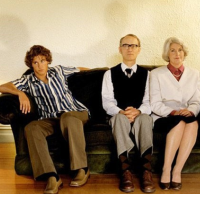Americans, Age 18-34, More Likely to Live with Parents than Romantic Partners
 (photo: Getty Images)
(photo: Getty Images)
By Tamar Lewin, New York Times
The empty nests are filling up: For the first time in modern history, young adults ages 18 to 34 are more likely to live with a parent than with a romantic partner, according to a new census analysis by the Pew Research Center.
Millennials, who have been slower than previous generations to marry and set up their own households, reached that milestone in 2014, when 32.1 percent lived in a parent’s home, compared with 31.6 percent who lived with a spouse or a partner, the report found.
“The really seismic change is that we have so many fewer young adults partnering, either marrying or cohabiting,” said Richard Fry, the Pew economist who wrote the report. “In 1960, that silent generation left home earlier than any generation before or after, because they married so young.”
But in recent decades, fewer people have been marrying, and those who do are marrying at older ages. In 1960, the median age for a first marriage was 20 for women and 22 for men, and just one in 10 people over 25 had never married. Now, the median ages are 27 and 29, and one in five adults older 25 has never married. In a 2014 study, Pew projected that a quarter of this generation of young adults might never marry.
“This is neither the best nor the worst development we’ve seen in family life,” said Andrew J. Cherlin, a sociologist at Johns Hopkins University. “It violates our cultural sense of how young adults should live their lives. But in Italy, an even greater percentage live with the parents, and no one sees it as problem. Families can feel closer to each other and have longer times together.”
But in some cases, he cautioned, the grown children’s continued presence in the parental home can signal an inability to take the steps needed to become real adults.
“Some young adults have the failure-to-launch syndrome,” he said. “Others are living their own lives, saving money but not having to pay rent while they enroll in grad school or get the internships they need.”
As far back as 1880, romantic coupling was the most common living arrangement for young adults.
While living with parents is now on the rise, the report found, other accommodations, too, are becoming more common. About 22 percent of young adults now live in a dormitory or a prison, or with a relative like a grandparent or a sibling — compared with 13 percent in 1960.
With the growing rates of single parenthood, about 14 percent of young adults — nearly triple the share in 1960 — head their own households, some living with roommates or boarders, others alone or with their young children.
Young men have consistently been more likely to live with their parents than young women have, and that remains true, generally because women marry younger and move out. But now living with parents is on the cusp of becoming the dominant arrangement for young women as well.
“What you tend to see is that racial and ethnic minorities, African-Americans, Hispanics and Native Americans, especially from disadvantaged backgrounds, are the most likely to be living in their parent’s home and the least likely to have a partner,” Fry said, adding that financial difficulties helped explain that finding.
“So you might think that the growing diversification of the population is what accounts for the shift to living with parents,” he continued. “But that doesn’t explain it, since even among white young adults, about 20 percent lived with their parents in 1960, and about 30 percent in 2014. So even if the population had not diversified, we would still see this large increase in living with parents.”
To Learn More:
For First Time in Modern Era, Living With Parents Edges Out Other Living Arrangements for 18- to 34-Year-Olds (by Richard Fry, Pew Research Center)
More Millennials Living at Home with Parents, Even as Job Market Improves (by Noel Brinkerhoff, AllGov)
Record Percentage of Young Adults Living with Parents (by Noel Brinkerhoff, AllGov)
One-Third of Workers Under 35 Live with Parents (by Noel Brinkerhoff and David Wallechinsky, AllGov)
- Top Stories
- Unusual News
- Where is the Money Going?
- Controversies
- U.S. and the World
- Appointments and Resignations
- Latest News
- Musk and Trump Fire Members of Congress
- Trump Calls for Violent Street Demonstrations Against Himself
- Trump Changes Name of Republican Party
- The 2024 Election By the Numbers
- Bashar al-Assad—The Fall of a Rabid AntiSemite






Comments